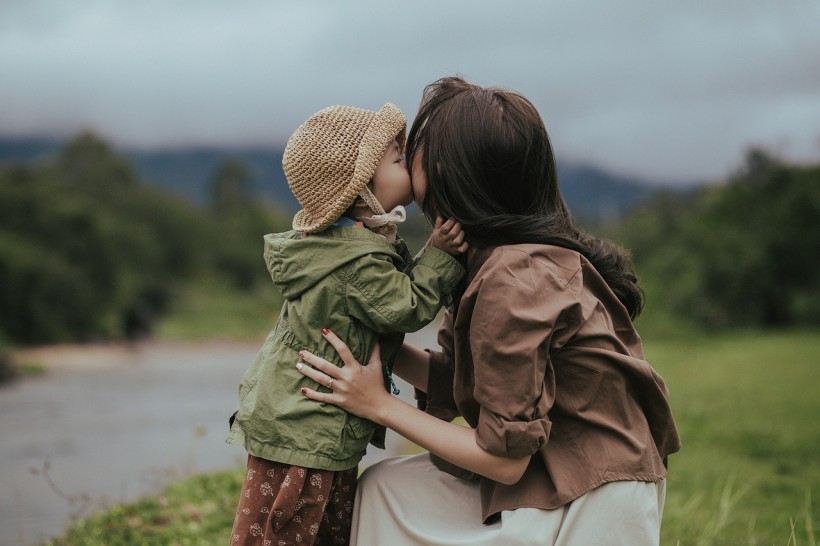In some families, parents kiss their children on the lips. While this may be acceptable for them, the question lies in whether the practice is healthy or normal to do.
Is It Normal For Parents To Kiss Their Child on the Lips?
The topic has been a long-standing subject of debate. In fact, according to Dr. Ryan Sultan, a board-certified child psychiatrist, therapist, and professor at Columbia University, kissing as a form of affection is considered as old as human civilization. The practice has been widely used to express connection, comfort, and love.
Across several cultures, the gesture is perceived as an innocent, pure, and heartfelt expression of parental love, Dr. Sultan explains.
However, there are certain factors that may affect how the child receives and experiences the gesture. Dr. Ketan Parmar, a psychiatrist and mental health expert at ClinicSpots, explained in an email that these factors include family dynamics, cultural context, child preferences and personality, and kiss frequency and intensity.
Healthy or Problematic?
Several psychologists think that affectionate physical contact, where kissing on the lips falls under, could help children develop a sense of security, self-esteem, and attachment. Dr. Kezia Joy, MD, who has a clinical science background with extensive experience on the subject and who works for Welzo, explains that it may relay warmth and loveand that it could help children feel important and emotionally connected with their parents. It could also generally aid with the child's emotional development.
The practice can also teach children the importance of expressing love in future relationships, as children learn by observing.
However, Dr. Hans Watson, a neuropsychiatrist and expert psychotherapist from University Elite PLLC, explains that kissing on the lips could be either healthy or problematic depending on how well parents teach their kids about differing family roles, stressing further that parents who kiss their child on the lips should be careful and ensure that they are not granting any age-inappropriate privileges to their children.
"In families where parents tend to have struggles with vulnerability and emotional intimacy, the children are all often used as a replacement for healthy emotional intimacy and kissing on the lips in these couples is oftentimes so dangerous and emotionally confusing for these children that we see a high rate of psychosomatic symptoms in these families," Dr. Watson adds.
Dr. Joy also notes that if lip kissing is done inappropriately or without sensitivity to the comfort level of the child, it may lead to discomfort, confusion, or boundary issues, noting further that it is vital for a child's boundaries and autonomy to be respected when it comes to physical affection.
Moreover, unless the gesture is contextualized properly, children might need extra help in understanding boundaries of affection outside of the home. This could potentially result in confusion in interactions with peers or other adults, Dr. Sultan explains.
It is also crucial to consider the age-appropriateness of the gesture, as children's understanding of physical affection evolves as they grow. Dr. Sultan notes that, given this, it is crucial for parents to foster open communication and to make sure that the child feels comfortable with it and that the act is congruent with the child's evolving boundaries.
When Should Parents Stop Kissing Their Child on the Lips?
Dr. Parmar notes that when parents should stop kissing their kids on the lips does not have any definitive answer, as different families may have varying boundaries and preferences.
However, there are some guidelines that parents can keep in mind. For one, it is important for them to respect the wishes and signals that their child may convey. If signs of embarrassment, resistance, or discomfort are shown, the child should not be forced nor should they be made to feel guilty. Rather than this, they can be asked regarding their feelings and preferences.
It is also important to consider the developmental needs and stage of the child. As children become older, they become more aware and may want to have more privacy and autonomy.
Children should also be taught that their bodies are their own. They must know their right to set boundaries regarding who gets to touch them and how they can be touched. They can also be educated regarding the various expectations and preferences that people may have when it comes to displaying affection.
Dr. Joy adds that physical affection must also be balanced out with emotional and verbal expressions of affection. These varying ways of expressing love and support can help foster an emotional connection that is well-rounded.
Parents should also openly and honestly communicate with their child, explaining the reason behind the gesture, what it means to them, and how it is different from other kisses. This could help children process their reactions and feelings. Parents should also listen to the feelings and views of their children regarding the matter.
Overall, it is important for parents to be observant and responsive to the cues and comfort levels of their children. Bayu Prihandito, a certified psychology expert and life coach and the founder of Life Arhitekture, notes that parents should keep in mind that there are many ways to share affection and that it is important to ensure that the child feels respected, secure, and loved as they grow older and become more independent.
RELATED ARTICLE: Orphaned Baby Manatee in Colombia Rescued in A Swamp in Hopes of Saving It
Check out more news and information on Psychology in Science Times.















